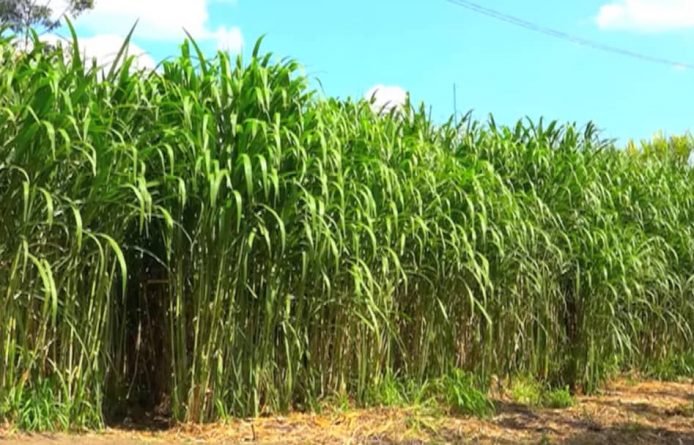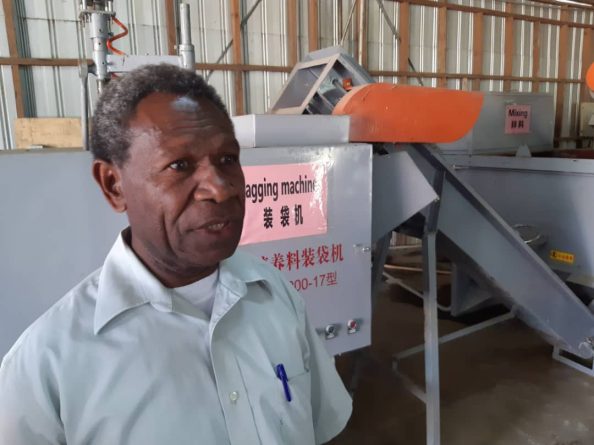Usually the mushrooms we get in Papua New Guinea are expensive and the technology behind is a mystery to many. But in Goroka, a provincial government project backed a team of Chinese scientists from the Fujian Agriculture and Forestry University (FAFU) are teaching Eastern Highlanders how to grow their own mushrooms.
The mushroom production is being managed together with a rice project.
It’s a simple operation that uses mostly local materials for building and mushroom growing.
One of the first things you see when you enter the small research compound tucked away in North Goroka, is the tall grass planted in rows. The grass variety of the local pitpit but the stalks are thicker and leaves are bigger.

The grass brought from Southern China is central to an interdependent agricultural system being adopted by farmers in the Eastern Highlands.
“The grass is suitable to grow here. You have a lot of local materials here and your climate it suitable for the grass to grow. The yield is very high and one hectare can produce 800 tons of fresh grass.”
The primarily use of Lin grass is in the creation of growing material for a highland mushroom variety farmers have been cultivating in their villages.
Lin Yinxing, an agronomist who first came to Papua New Guinea in 1998 to work on mushroom research is the lead scientist. He says it took a lot of experimentation and time to develop a suitable method of mushroom growing and the Eastern Highlands climate is perfect.
“With these kinds of mushroom, you can grow it in Eastern Highlands all year round. Dry season or wet season, every season you can plant these mushrooms. So it’s very suitable for Eastern Highlands province.”
When the grass grow to about 8 meters, they are harvested and put out to dry in the sun. The stalks are then crushed and ground into a pulp. This is what they use as a substrate – the dry material from which the mushrooms grow.
This project has a 20 year history. In 1998, the Eastern Highlands Provincial Government signed a sister province cooperation agreement with the Fujian province. The Governor of Fujian then, was Xi Jingping, who is now the President of China.
This relationship paved way for the transfer of simple technologies and skills that, in the long run, won’t need ongoing donor support.
“We also got China Aid support of K15 million for three years,” says Frank Wanguapi, the Natural Resource Advisor with the Eastern Highlands Provincial Administration.

In the mushroom incubation center – a small structure built of bamboo and Lin grass stalks – plastic tubes loaded powdered grass stalk and inoculated with mushroom spores, are stacked from the ground up. The Chinese scientists, used mostly local materials to build the mushroom incubation center.

“Apart from the plastic sheeting, we don’t use imported material. In China, we plant mushrooms in buildings because during winter, the temperature is too cold and in summer, it’s too hot. Your climate is good. It doesn’t get too hot or too cold,” Lin Yinzing explains.
Mushrooms are a low volume, high value crop. Because they are fast growing, farmers stand to make higher profits in a much shorter time. Farmers begun selling mushrooms after four months of training.
The demand for mushrooms is very high in Goroka with one kilogram selling for K30.
Eastern Highlands Governor, Peter Numu, support from the Provincial Government stems from the desire to reduce the dependence of people on food imports and government support.
“People are growing their own rice to eat and with the mushrooms, they won’t need to buy food from stores. We will also commercialize the rice production. We want to package it, label it and sell it. This will be done by the Provincial Government’s business arm.
“People are already empowered. If the government of Prime Minister, James Marape, is talking about reducing food import dependence, I want to say, the Eastern Highlands is already implementing a solution.”
By Scott Waide, EMTV News, Lae

